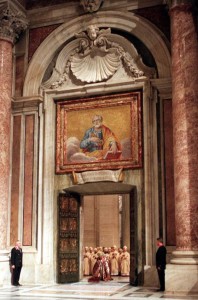By: Jennifer E. Miller, S.T.D., Professor of Moral Theology
This catechesis continues the family catecheses which Pope Francis began after the Extraordinary Synod on the Family last year, October 5-19, 2014, entitled, “Pastoral Challenges of the Family in the Context of Evangelization”. These catecheses were originally intended to help the faithful in their preparation for this year’s recently-finished Ordinary Synod.
Dr. Miller’s comments can be found in the blue boxes as you read her translation.
The Family – 33. The Door of Welcome
With this reflection, we have arrived at the doorsteps of the Jubilee, it is near. Before us is the door, but not only the holy door, the other door: the great door of the Mercy of God – and that is a beautiful door! –, that welcomes our repentance, offering the grace of his forgiveness. The door is generously open, a bit of courage on our part is necessary in order to cross the threshold. Each one of us has within himself things that weigh him down. All of us are sinners! Let us profit of this moment that is arriving and cross the threshold of this mercy of God who never tires of forgiving, who never tires of waiting for us! He watches us, he is always beside us. Courage! Let us enter by this door!
The Lord never forces the door: He even asks for permission to enter. The Book of the Apocalypse says: “I stand at the door and knock. If someone hears my voice and opens the door to me, I will come to him, I will dine with him and he with me” (3:20). But let us imagine the Lord knocking at the door of our hearts! And in the last great vision of the Book of the Apocalypse, thus it is prophesied of the City of God: “Its doors will never close during the day”, which means always, because “there will be no more night” (21:25). There are places in the world in which doors are not locked, these still exist. But there are many where armored doors have become normal. We must not surrender to the idea that we must apply this system to our entire life, to the life of the family, of the city, of society. And much less to the life of the Church. It would be terrible! An inhospitable Church, just like a family closed in upon itself, demeans the Gospel and dries up the world. No armored doors in the Church, none! May they all be open!
The symbolic management of the “doors” – of doorsteps, of passages, of frontiers – has become crucial. The door must protect, certainly, but not reject. The door must not be forced, on the contrary, one asks for permission, because hospitality shines forth in the freedom of welcome and is obscured in the insolence of invasion. The door is frequently opened, to see if outside there is someone who waits, and maybe does not have the courage, perhaps not even the strength to knock. How many people have lost trust, no longer have the courage to knock at the door of our Christian heart, at the doors of our churches….and they are there, they do not have the courage, we have taken away their trust: please, may this never happen. The door says many things about the house, and also of the Church. The management of the door requires attentive discernment and, at the same time, must inspire great trust. I would like to devote a word of gratitude to all of the doorkeepers: of our apartments, of our civic institutions, of our very own churches. Often the good sense and the courteousness in reception areas are capable of offering an image of humanity and of welcome to the entire house, already at the entrance. There is to learn from these men and women, who are custodians of places of encounter and of welcome in the city of man! To all of you custodians of many doors, whether they be doors of homes or doors of churches, many thanks! But always with a smile, always demonstrating the welcome of this house, of this church, so that people feel happy and welcomed in that place.
In truth, we know that we ourselves are the custodians and the servants of the Door of God, and how is the door of God called? Jesus! He enlightens us in regard to all of the doors of life, including those of our birth and of our death. He Himself affirmed this: “I am the door: if one enters by me, he will be saved; he will enter and go out and he will find pasture” (John 10:9). Jesus is the door that allows us to enter and to go out. Because the sheep pen of God is a refuge, it is not a prison! The house of God is a refuge, it is not a prison, and the door is called Jesus! And if the door is closed, we say: “Lord, open the door!”. Jesus is the door and he allows us to enter and to go out. They are thieves, those who seek to avoid the door: it is curious, thieves always seek to enter by another way, by the window, by the roof, but they avoid the door, because they have bad intentions, and they sneak into the sheep pen to deceive the sheep and to exploit them. We must pass through the door and listen to the voice of Jesus: if we hear his tone of voice, we are safe, we are saved. We can enter without fear and go out without danger. In this beautiful discourse of Jesus, the watchman is also spoken of, who has the task of opening to the Good Shepherd (cfr. John 10:2). If the watchman hears the voice of the Shepherd, then he opens, and allows the sheep that the Shepherd brings to enter, all of them, including those lost in the woods, that the Good Shepherd had left to find. The sheep are not chosen by the watchman or by the parish secretary; the sheep are all invited, they are chosen by the Good Shepherd. The watchman – he also – obeys the voice of the Shepherd. Voila, we can well say that we must be like that watchman. The Church is the doorman of the house of the Lord, she is not the owner of the house of the Lord.
The Holy Family of Nazareth knows well what an open or closed door means, for one who expects a son, for one who does not have a refuge, for one who must escape danger. May Christian families make of the thresholds of their homes a little great sign of the Door of mercy and of the welcome of God. And it is precisely in this way that the Church must be recognized, in every angle of the earth: as the custodian of a God who knocks, as the welcome of a God who does not close the door in someone’s face, with the excuse that you are not at home. With this spirit we draw near to the Jubilee: there will be the holy door, but there will be the door of the great mercy of God! May there also be the door of our heart in order to receive the forgiveness of God and to give forgiveness in our turn, welcoming all those who knock at our door.

Part of the the beauty of a Jubilee Year is participation in the Jubilee Indulgence. The blessings and mercies for this next year are many, and in his Jubilee Letter, Pope Francis outlines specifically how to obtain and rejoice in the merciful Indulgence of this upcoming Jubilee: “I wish that the Jubilee Indulgence may reach each one as a genuine experience of God’s mercy, which comes to meet each person in the Face of the Father who welcomes and forgives, forgetting completely the sin committed. To experience and obtain the Indulgence, the faithful are called to make a brief pilgrimage to the Holy Door, open in every Cathedral or in the churches designated by the Diocesan Bishop, and in the four Papal Basilicas in Rome, as a sign of the deep desire for true conversion. Likewise, I dispose that the Indulgence may be obtained in the Shrines in which the Door of Mercy is open and in the churches which traditionally are identified as Jubilee Churches. It is important that this moment be linked, first and foremost, to the Sacrament of Reconciliation and to the celebration of the Holy Eucharist with a reflection on mercy. It will be necessary to accompany these celebrations with the profession of faith and with prayer for me and for the intentions that I bear in my heart for the good of the Church and of the entire world.”
Pope Francis, Jubilee Letter, September 1, 2015
About the Author: Jennifer E. Miller, S.T.D., Professor of Moral Theology

Cajun by birth, Dr. Jennifer E. Miller comes from the Lafayette area. She earned her BA in theology from the Franciscan University of Steubenville in 2002, after which she worked for two years in youth ministry in the Ville Platte area of southern Louisiana.
Travelling to Rome to complete her studies, she earned an STB at the Pontifical University of St. Thomas Aquinas in 2007 and an STL in moral theology at the Pontifical Gregorian University in 2009. After a year of postgraduate studies at the John Paul II Pontifical Institute for Studies on Marriage and Family, Dr. Miller began work on a doctorate in Catholic Social Doctrine at the Pontifical University of the Holy Cross. During this time, she also worked as assistant to Msgr. Martin Schlag, consultor to the Pontifical Council for Justice and Peace, and as the Directress of Studies at the Markets, Culture and Ethics Research Centre, an interdisciplinary research center between philosophy, theology, and economics that seeks to encourage and promote the virtuous culture necessary for an ethical economic system. Her STD was completed in 2013, with a thesis critiquing and reformulating Amartya Sen’s capabilities approach in light of the principle of subsidiarity and the family.
Dr. Miller has previously taught moral theology at the Aquinas Institute in Lafayette, Louisiana and was involved in teaching at Christendom College’s Rome Campus and at the Institute of Higher Religious Studies at the Apollinare (ISSRA), located at the Pontifical University of the Holy Cross. She has taught and published both in English and in Italian. Dr. Miller believes that the moral life is best lived when it is understood as the call to holiness, to the beauty of the virtuous life in Christ directed towards beatitude, rather than as a system of exterior rules and obligations; she seeks to impart this understanding and this way of living the moral life to her students.
Jennifer E. Miller, S.T.D.
Office Location
St. Joseph Hall – Room 109
Contact
Email: jmiller@nds.edu
Disclaimer
All opinions published by the authors on this blog are solely those of the authors. Although the goal is that they should, they do not necessarily express the views and opinions of the Archdiocese of New Orleans, Notre Dame Seminary, the Church, or their respective dioceses and bishops.
Notre Dame Seminary and the Archdiocese of New Orleans are not responsible for the comments of commenters, although every effort will be made to remove offensive comments.
If you should find an error or offensive content, please email the NDS Blog editorial team.




